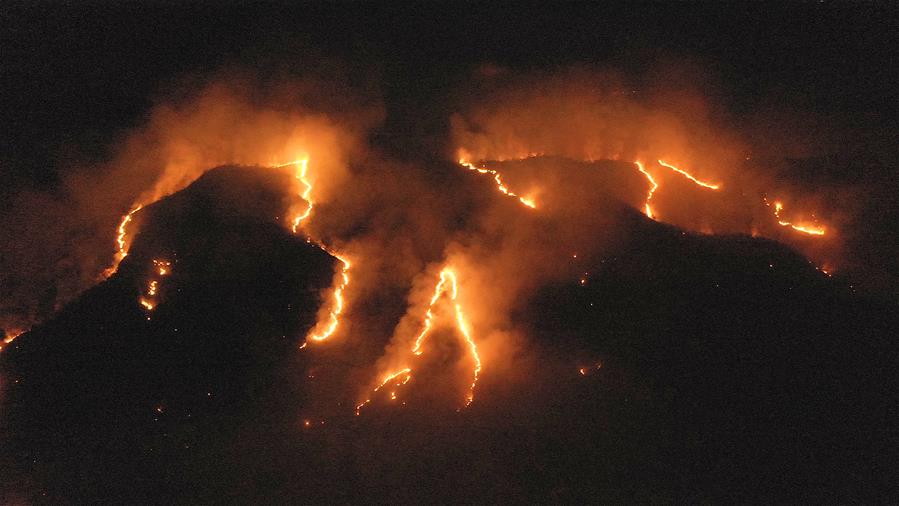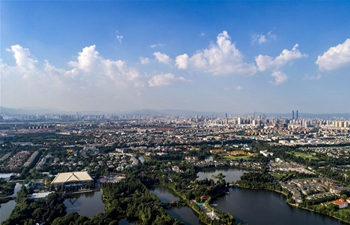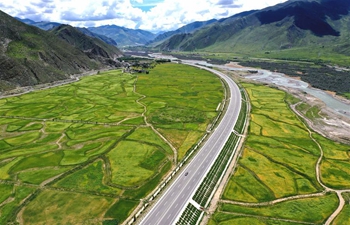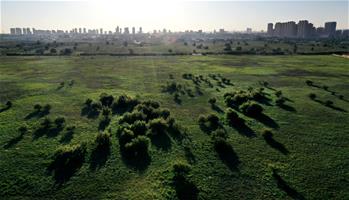 ?
?Image taken on Aug. 17, 2019 shows a raging fire in the Amazon rainforest in the state of Tocantins, Brazil. Data from the National Institute for Space Research show that the number of forest fires in Brazil soared by 82 percent from January to August this year compared to the same period last year. (Dida Sampaio/AGENCIA ESTADO/Handout via Xinhua)
WASHINGTON, Aug. 23 (Xinhua) -- Record fires sweeping across the Amazon this month have been grabbing global headlines as scientists and environmental groups are worried that they will aggravate climate change crisis and threaten biodiversity.
"Any forest destroyed is a threat to biodiversity and the people who use that biodiversity," Thomas Lovejoy, an ecologist at George Mason University told the National Geographic.
"The overwhelming threat is that a lot of carbon goes into the atmosphere," he stressed.
As the largest rainforest in the world, the Amazon is often called "the lungs of the world." It is also home to about 3 million species of plants and animals, and 1 million indigenous people.
The vast swaths of rainforest play an important role in the world's ecosystem because they absorb heat instead of it being reflected back into the atmosphere. They also store carbon dioxide and produce oxygen, ensuring that less carbon is released, mitigating the effects of climate change, according to scientists.
"In the midst of the global climate crisis, we cannot afford more damage to a major source of oxygen and biodiversity. The Amazon must be protected," U.N. Secretary General Antonio Guterres said via twitter.
Data from the National Institute for Space Research (Inpe) show that the number of forest fires in Brazil soared by 82 percent from January to August this year from a year ago.
A total of 71,497 forest fires were registered in the country in the first eight months of 2019, up from 39,194 in the same period in 2018, Inpe said.
"We estimate that the forest areas in the Brazilian Amazon have decreased something between 20 and 30 percent compared to the last 12 months," Carlos Nobre, a researcher at the University of Sao Paulo, told German broadcaster Deutsche Welle.
Brazilian President Jair Bolsonaro on Wednesday blamed non-governmental organizations for increasing wildfires in the Amazon rainforest, but his claim was refuted by environmentalists who have been raising concerns about deforestation since he took office in 2018.
The government's anti-environmental policy fuelled deforestation and burning, they said.
French President Emmanuel Macron called the wildfires an international crisis and said the leaders of the Group of 7 nations should hold urgent discussions about them at their summit in France this weekend.
"Our house is burning. Literally. The Amazon rain forest -- the lungs which produces 20 percent of our planet's oxygen -- is on fire," Macron tweeted.
Bolsonaro hit back with his own tweet: "I regret that Macron seeks to make personal political gains in an internal matter for Brazil and other Amazonian countries. The sensationalist tone he used does nothing to solve the problem."
Brazil owns about 60 percent of the Amazon rainforest, whose degradation could have severe consequences for global climate and rainfall.
The extent of the area ruined by fires has yet to be determined, but the emergency has transcended Brazil's borders, reaching Peruvian, Paraguayan and Bolivian regions.











